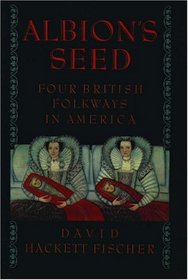Search -
Albion's Seed: Four British Folkways in America (America)
Albion's Seed Four British Folkways in America - America
Author:
This book is the first volume in a cultural history of the United States, from the earliest English settlements to our own time. It is a history of American folkways as they have changed through time, and it argues a thesis about the importance for the United States of having been British in its cultural origins. From 1629 to 1775, North Ameri... more »
Author:
This book is the first volume in a cultural history of the United States, from the earliest English settlements to our own time. It is a history of American folkways as they have changed through time, and it argues a thesis about the importance for the United States of having been British in its cultural origins. From 1629 to 1775, North Ameri... more »
ISBN-13: 9780195069051
ISBN-10: 0195069056
Publication Date: 3/14/1991
Pages: 972
Rating: 7
ISBN-10: 0195069056
Publication Date: 3/14/1991
Pages: 972
Rating: 7
4.4 stars, based on 7 ratings
Publisher: Oxford University Press
Book Type: Paperback
Members Wishing: 22
Reviews: Amazon | Write a Review
Book Type: Paperback
Members Wishing: 22
Reviews: Amazon | Write a Review
Genres:
- History >> Americas >> United States >> Colonial Period >> General
- History >> Europe >> England >> General
- Nonfiction >> Social Sciences >> Anthropology >> Cultural




